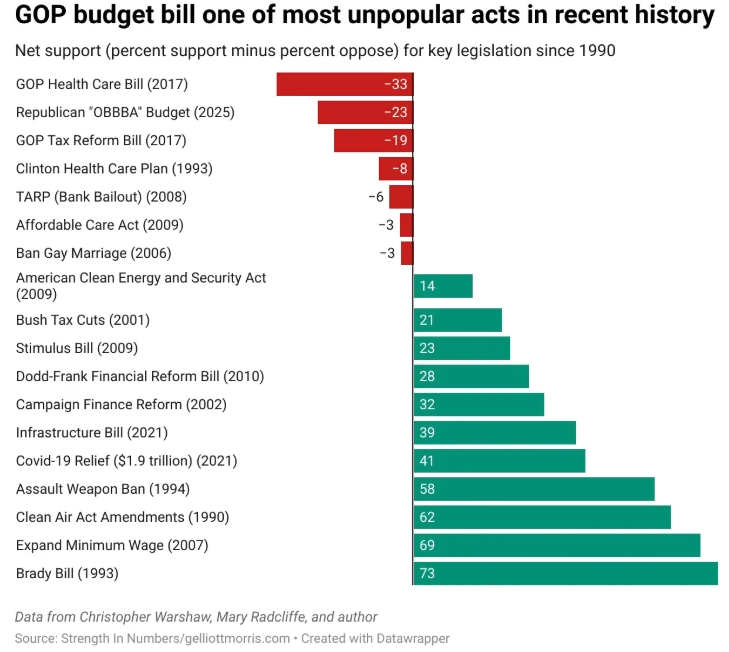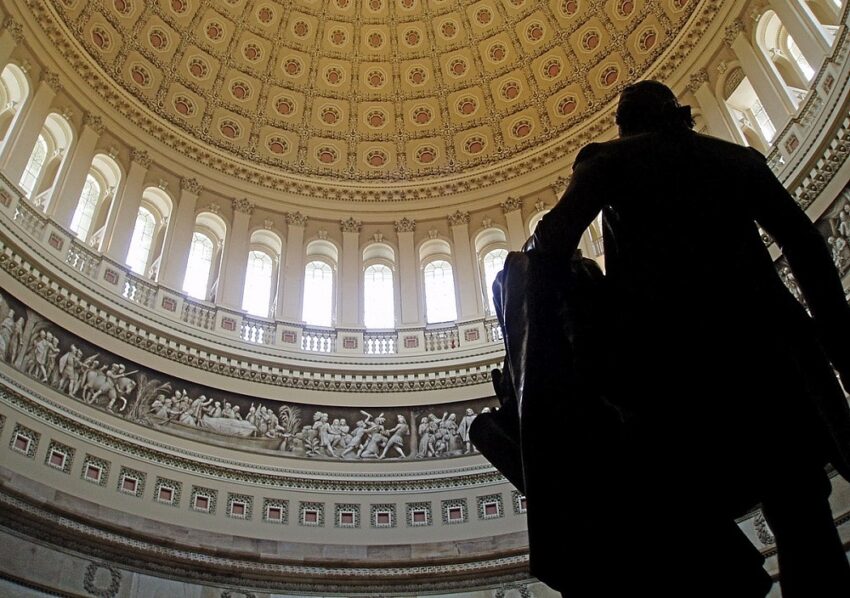G. Elliott Morris (“One Big Unpopular Bill“) reflects on what, by any ordinary measure, would seem a political own-goal by Congressional Republicans:
The “One Big Beautiful Bill Act” (yes, that is its official government name) is a huge package of different policies, including tax cuts for the wealthy and the largest ever yearly increase (hundreds of billions of dollars) in funding for the Pentagon, ICE, and CBP. Republicans have “paid for” those tax cuts and spending increases by making the largest ever cuts to Medicaid and government food benefits, among other programs.
[…]
The OBBBA is also historic in another way: It is likely the most unpopular budget ever, is the second most unpopular piece of key legislation since the 1990s, and the most unpopular key law, period, over the same period.
He provides plenty of data and analysis, but this chart will suffice for our purposes:

As one might imagine, the opposition party is well aware.
POLITICO (“Dems are gearing up to weaponize Trump’s megabill“):
Democrats believe President Donald Trump’s tax-and-spend megabill gives them a heavy cudgel ahead of the 2026 midterms. Now they have to effectively wield it as they try to reclaim the House.
Ad-makers have quickly prepped attack ads to air as soon as the holiday weekend is over, including in Pennsylvania, Michigan and Wisconsin. House Democrats are plotting to turn the August recess into the opening salvo of the midterms, including through town halls and organizing programs.
And Democrats see an opportunity to expand the battleground, going on offense into red areas across the country. The bill that passed Thursday has already triggered a spike in candidate interest deep into Trump territory, House Majority PAC said. Separately, Democrats are digging into a round of candidate recruitment targeting a half-dozen House districts Trump won by high single or double digits, according to a person directly familiar with the Democratic Congressional Campaign Committee’s plan and granted anonymity to describe private conversations. They’re recruiting Democrats to challenge Reps. Ann Wagner of Missouri, Maria Elvira Salazar of Florida, Andy Ogles of Tennessee, Kevin Kiley of California, Nick LaLota of New York and Jeff Crank of Colorado
“There’s almost nothing about this bill that I’m going [to] have a hard time explaining to the district,” said Rep. Jared Golden (D-Maine), who represents a district Trump won by 9 points. “This is a giant tax giveaway to wealthy people. Everyone fucking knows it.”
Democrats’ renewed bravado comes after months in the political wilderness, following sweeping losses across the country last year. And it’s not just the megabill’s consequences that give them electoral hope.
Leading to Thursday’s vote was a series of moves they believe portend success: North Carolina Sen. Thom Tillis, who criticized the bill for its steep Medicaid cuts before voting against it, announced his plans to not seek reelection last weekend. Rep. Don Bacon (R-Neb.), who represents one of the three GOP-held districts that voted for Kamala Harris in 2024, also announced his plans to not run for reelection. That opened up two top midterm battleground races in one weekend.
Democrats have also been far more in sync with their pushback in recent days after months of struggling to unify around a coherent message during Trump’s second term. House Democratic Leader Hakeem Jeffries’ record-setting speech on the House floor Thursday morning mirrored those of several Democratic candidates who mentioned Medicaid cuts in their campaign launches this week.
With some notable exceptions, Republican Members aren’t morons. Many know this is a bad bill, bad for their constituents, and bad for their re-election chances. Under any normal circumstances, then, enough of them would have defected to deny the bill passage. Or, at least they could have demanded massive changes to make the bill less awful. They did not.
As I noted a couple days ago, the explanation is pretty simple: they fear Trump turning on them in the GOP primaries more than they fear their constituents. That’s unprecedented, at least in the modern era.
As another POLITICO piece (“Inside the Freedom Caucus’ final surrender“) notes that this applied even to the hardest-to-wrangle bloc.
It used to be the congressional equivalent of a five-alarm fire: Members of the House Freedom Caucus were holding out, refusing to go along with Republican leaders’ plans for high-stakes legislation.
But when Speaker Mike Johnson brought the GOP’s “big, beautiful bill” to the House floor this week, few were surprised when the band of hardcore conservatives threatened once again to take down the bill. And even fewer took their threats seriously.
“They do this every time — every dadgum time,” said Rep. Tim Burchett (R-Tenn.), a hard-right member who himself has occasionally held out on GOP leaders.
The endgame was in fact predictable: A band of about 10 hard-right members refused to vote the party line on a series of procedural votes Wednesday night and Thursday morning, prompting an all-hands-on-deck negotiating blitz that left the House in limbo for hours.
In the end, they all ended up voting for the bill.
It was the latest episode calling the aims of the Freedom Caucus into question as President Donald Trump asserts his dominance over the Republican Party and Washington in general. Founded under a Democratic president and forged by veterans of the tea party movement, the group is now finding it hard to buck the most powerful Republican leader in generations. After the vote closed Thursday, multiple Freedom Caucus members cast their interventions as crucial in moving the centerpiece of the GOP’s domestic policy agenda to the right.
“If you go back six months ago, we were told no Medicaid,” Rep. Chip Roy of Texas, a key Freedom Caucus leader, said, referring to Trump’s promises not to touch the joint federal-state health program. Ultimately, the bill is set to make $1 trillion worth of cuts over the coming decade.
“I wanted more — we should have done better,” Roy added. “But at the end of the day, [we got a] pretty historic bill.”
The problem their less confrontational colleagues see is that the band of hard-liners is constantly drawing red lines and delivering ultimatums, only to violate them — sometimes in a matter of hours.
This group famously ended the careers of multiple Republican Speakers. They have zero party loyalty. But they don’t dare buck the big boss.
Punchbowl News (“Five takeaways from the GOP reconciliation drama“) notes that pretty much everyone caved.
The Freedom Caucus was always going to have a difficult time in a Trump-run Washington. You can’t simultaneously pledge loyalty to Trump and then vote against a vengeful president’s agenda.
The HFC talked tough but caved repeatedly throughout this process. This latest episode was perhaps the most embarrassing. A number of HFC members said they were going to vote no, issued a three-page document outlining huge problems with the Senate GOP bill, and then they all voted yes, getting nothing substantive in return.
[…]
This was Speaker Mike Johnson and Senate Majority Leader John Thune’s first major legislative project together. And it ended in a win. But there may be a steep cost, especially for Republican moderates in ‘26.
Johnson and Thune kept in close touch throughout the process, although the coordination frayed at the end. Thune and GOP senators changed much of the House bill – as most predicted they would – and it seemed to chafe on Johnson.
Johnson, along with House Majority Leader Steve Scalise, worked very closely with the White House to get the bill across the finish line. Much of the last-minute wrangling was handled by Trump and top administration officials, not House leaders. Yet the relationship between Johnson and Trump has grown ever closer. Trump listens to and buys into Johnson and Scalise’s advice. This was a major win for the speaker.
Thune’s biggest problem ended up being not the conservative hardliners but rather those worried about the steeper Medicaid cuts Thune was pushing.
[…]
After the House just barely passed the initial version of reconciliation in May, Johnson pleaded with Thune publicly and privately to resist changing the bill too much, pointing to his razor-thin vote margin.
Sure, Thune ultimately acquiesced to the House’s SALT demands. But the South Dakota Republican made major adjustments to the structure of the Medicaid cuts, extracting an extra $200 billion. Thune happily noted to us this week that the Senate’s version was more conservative than the House’s, in his view.
Some of Thune’s own senators were upset about the Medicaid overhaul. When Sen. Bill Cassidy (R-La.) warned Thune that this approach wouldn’t fly with the House, Thune responded confidently: The House will pass what we send them.
Thune was right. While it was a gamble, Thune made the calculation that with Trump pressuring them, House Republicans would pass the measure as is. They did.
This is, to say the least, not the relationship between the President and Congress that James Madison envisioned. Or that of Schoolhouse Rock.
But it seems to be Trump-specific. Joe Biden got a lot done in his four years, but was famously repeatedly hamstrung by Joe Manchin and Kyrsten Sinema. They did not fear Biden. At all.
And, no, it’s not that Biden was too old or too weak. Barack Obama didn’t have that kind of hold over his congressional co-partisans. Nor did George W. Bush, Bill Clinton, or George H.W. Bush. Ronald Reagan came the closest, at least in my contemporary recollection, but he got the votes because he was popular, not through intimidation.
Click this link for the original source of this article.
Author: James Joyner
This content is courtesy of, and owned and copyrighted by, https://www.outsidethebeltway.com and its author. This content is made available by use of the public RSS feed offered by the host site and is used for educational purposes only. If you are the author or represent the host site and would like this content removed now and in the future, please contact USSANews.com using the email address in the Contact page found in the website menu.








